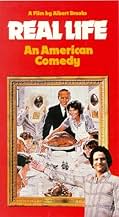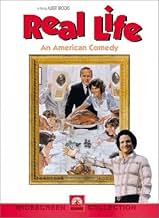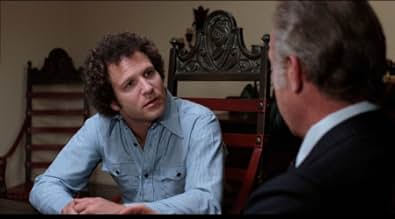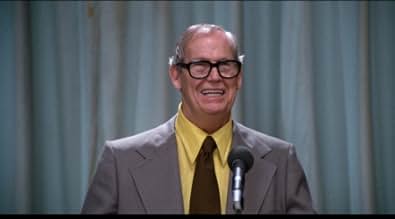IMDb-BEWERTUNG
7,0/10
4424
IHRE BEWERTUNG
Ein Filmteam macht sich daran, ein Jahr im Leben einer durchschnittlichen Familie festzuhalten.Ein Filmteam macht sich daran, ein Jahr im Leben einer durchschnittlichen Familie festzuhalten.Ein Filmteam macht sich daran, ein Jahr im Leben einer durchschnittlichen Familie festzuhalten.
- Regie
- Drehbuch
- Hauptbesetzung
Empfohlene Bewertungen
Albert Brooks (himself) undertakes an ambitious year long project documenting the lives of a typical American family. With the assistance of Psychological professionals and expensive testing and searching methods, Brooks' team selects the Yeager family of Phoenix, Arizona consisting of husband and wife Warren and Jeannette (Charles Grodin and Frances Lee McCain respectively) and their two children Lisa and Eric (Lisa Urette and Robert Stirrat respectively). As Brooks ingrains himself and his crew in the lives of the Yeager's the family come under ever increasing strain with Brooks' invasive presence in their lives.
Real Life is the directorial debut of comedian Albert Brooks. Brooks had attained prominence with his stand-up work as well as supporting parts on television and a bit role in Martin Scorcese's Taxi Driver. Brooks raised the money for the film's production budget himself and collaborated on the script Harry Shearer and Monica Johnson (the latter of whom would be a frequent collaborator with Brooks). When the film was released it received mixed reviews with much praise aimed at Charles Grodin's performance as Warren Yeager, but criticism directed at Brooks' "one note" performance. While the film did have champions such as Gene Siskel who claimed the film to be one of the funniest of the year, most critics liked the idea more than the execution. Real Life has some truly biting moments of satire and early signs of the promise of Brooks' future in the director's chair, there is a roughness in the execution that holds the movie back.
The fact that Harry Shearer is a co-writer on this film is rather appropriate, as it feels like a rough outline of ideas that would be adopted for a future mockumentary he'd be involved with, in This is Spinal Tap. The movie is very prescient with its satirization of PBS' An American Family where the invasiveness of cameras in one's life doesn't capture reality so much as distort it. Real Life feels like an indicator of what would serve as the template for reality TV with the reality often taking a backseat to Albert Brooks where the family are almost secondary characters in the movie that should be about them. The movie has some really strong moments of cutting humor with scenes such as the gynecologist office being uncomfortably funny. But there are also instances where the movie will abandon the Yeager family for long stretches as we focus on Albert Brooks negotiating with his Psychology advisors or studio executives in what are basically variations on the same point. While the central joke of the movie is in how Albert Brooks' character is making the movie more about him than the Yeagers (down to the fact he moves in across the street from them) most of the strongest set pieces are focused on the Family's interactions as they deal with the invasiveness of cameras in their lives but too often the family are sidelined. With that said there is some really funny material here that is both funny and intelligent but it's also rough and lacking in polish that comes from experience.
Real Life while moderately funny serves as more of a template for films such as This is Spinal Tap or Christopher Guest's filmography. It wouldn't be unfair to say that Real Life walked so that those future films could run and become the enduring classics they are. If you are a fan of those mockumentary style comedies like Best in Show or Waiting for Guffman then Real Life works as both an amusing diversion and a prototype of this type of comedic format. Slightly dated in some aspects, but predictive and ahead of its time in others.
Real Life is the directorial debut of comedian Albert Brooks. Brooks had attained prominence with his stand-up work as well as supporting parts on television and a bit role in Martin Scorcese's Taxi Driver. Brooks raised the money for the film's production budget himself and collaborated on the script Harry Shearer and Monica Johnson (the latter of whom would be a frequent collaborator with Brooks). When the film was released it received mixed reviews with much praise aimed at Charles Grodin's performance as Warren Yeager, but criticism directed at Brooks' "one note" performance. While the film did have champions such as Gene Siskel who claimed the film to be one of the funniest of the year, most critics liked the idea more than the execution. Real Life has some truly biting moments of satire and early signs of the promise of Brooks' future in the director's chair, there is a roughness in the execution that holds the movie back.
The fact that Harry Shearer is a co-writer on this film is rather appropriate, as it feels like a rough outline of ideas that would be adopted for a future mockumentary he'd be involved with, in This is Spinal Tap. The movie is very prescient with its satirization of PBS' An American Family where the invasiveness of cameras in one's life doesn't capture reality so much as distort it. Real Life feels like an indicator of what would serve as the template for reality TV with the reality often taking a backseat to Albert Brooks where the family are almost secondary characters in the movie that should be about them. The movie has some really strong moments of cutting humor with scenes such as the gynecologist office being uncomfortably funny. But there are also instances where the movie will abandon the Yeager family for long stretches as we focus on Albert Brooks negotiating with his Psychology advisors or studio executives in what are basically variations on the same point. While the central joke of the movie is in how Albert Brooks' character is making the movie more about him than the Yeagers (down to the fact he moves in across the street from them) most of the strongest set pieces are focused on the Family's interactions as they deal with the invasiveness of cameras in their lives but too often the family are sidelined. With that said there is some really funny material here that is both funny and intelligent but it's also rough and lacking in polish that comes from experience.
Real Life while moderately funny serves as more of a template for films such as This is Spinal Tap or Christopher Guest's filmography. It wouldn't be unfair to say that Real Life walked so that those future films could run and become the enduring classics they are. If you are a fan of those mockumentary style comedies like Best in Show or Waiting for Guffman then Real Life works as both an amusing diversion and a prototype of this type of comedic format. Slightly dated in some aspects, but predictive and ahead of its time in others.
'Real life' is the perfect send-up of the worst scenario possible for a film maker shooting a documentary, i.e., what happens when your subject matter loses interest in the project before completion? Albert Brooks, as the seemingly besieged director of this 'loaf of reality' year long vigil with a typical American family, walks a fine line between egomania and neuroticism and scores with broad belly laughs both ways. Charles Grodin as the head of the suburban clan from which this film within a film emanates exudes his special brand of bland exuberance at the beginning of this captive camera stakeout inside his home(and everywhere else he may go) provided his life is depicted as letter perfect from day to day. When such is not the case and the obtrusive lenses are interfering with his job as a veterinarian, (in a sequence that has to be seen rather than described) then Grodin regards the camera presence as nothing more than an albatross and mentally switches himself off. Albert Brooks, meanwhile, never says quit. Every so-called hair in the eye of the lense is still a perfect scene regardless of the participation or lack of it, thereof, from his celluloid family. For Brooks regards this film as 'paramount'(oops) over the desires of his cast of characters. Brooks facile mind works methodically from beginning to end. From his perspective, nothing can go wrong, everything is in its place with a place for everything. So when his documentary and the human equation around it blow up in his face , his conferences with colleagues are hilarious as he tries various remedies to salvage not only his project but his self-image. Brooks is a comic delight as a man who cannot take criticism regarding his methods and his interaction with project staff are decidedly one-sided, but in the capable hands of this farceur, his myopic viewpoint is always good for guffaws galore. Real life should be this funny.
There's no question that Albert Brooks is not for everybody - his particular blend of neuroticism and egomania can be way too much for most people. But if you can get on his wavelength, and when he's at his best - oh man! There's absolutely no one better. Real Life is Brooks' best movie, and deserves to be more widely known than it is. His portrayal of a controlling producer, who is willing to violate not only broadcast ethics but the standards of decency and good sense as well in order to inject life into his failing "documentary" is frightening, off-putting and truly hilarious all at once.
When I first saw this movie, I didn't realize it was based on an actual television experiment. I bring this up only because when I first saw the film, I felt its only flaw was that it didn't spend enough time showing the family and their disintegration in front of the cameras, choosing instead to focus almost exclusively on Brooks and his manic responses to the dilemma this posed. However, knowing that the real life experiment would have already been familiar to people, Brooks clearly wanted to use this movie to examine not the family but the bankrupt commercial mindset which would put such a project into play in the first place. As such, his satire is dead on and nobody could more perfectly embody the entertainment industry than Brooks himself. Just to see him smarmily singing and glad-handing at the beginning is worth the cost.
When I first saw this movie, I didn't realize it was based on an actual television experiment. I bring this up only because when I first saw the film, I felt its only flaw was that it didn't spend enough time showing the family and their disintegration in front of the cameras, choosing instead to focus almost exclusively on Brooks and his manic responses to the dilemma this posed. However, knowing that the real life experiment would have already been familiar to people, Brooks clearly wanted to use this movie to examine not the family but the bankrupt commercial mindset which would put such a project into play in the first place. As such, his satire is dead on and nobody could more perfectly embody the entertainment industry than Brooks himself. Just to see him smarmily singing and glad-handing at the beginning is worth the cost.
Any Albert Brooks fan who has not seen his first glorious feature is truly missing out. As anyone can attest, Brooks has the rare gift of turning ordinary human moments into riotously funny scenes, and this film is full of such moments, plus much more subversive material, like the way Grodin's character repeatedly comes perilously close to committing a felony against his family.
Perhaps the greatest joke of all is that while the character "Albert Brooks" continuously states how he is documenting real life, we all know that this is really a star vehicle for him. He is more concerned with how much everything costs, like the head-held cameras (for those who haven't seen it, imagine the result of torrid affair between Dave Bowman and the Hal-9000). This film, more that anything, is a satirical take on how Hollywood subverts what is really "real life," all this coming from a director with as great a grasp on how humans relate to one another than anyone.
Perhaps the greatest joke of all is that while the character "Albert Brooks" continuously states how he is documenting real life, we all know that this is really a star vehicle for him. He is more concerned with how much everything costs, like the head-held cameras (for those who haven't seen it, imagine the result of torrid affair between Dave Bowman and the Hal-9000). This film, more that anything, is a satirical take on how Hollywood subverts what is really "real life," all this coming from a director with as great a grasp on how humans relate to one another than anyone.
"Only six of these were ever made. Only five ever worked. We have four of those." IMHO this is the best movie Brooks ever made. He plays an egocentric, inept film director who turns a simple movie into a botched science experiment. The high-tech gadgetry is ultra low-tech these days. It's a gem of a movie. If you haven't seen it, it is well-worth renting -- or buying.
Wusstest du schon
- WissenswertesAlbert Brooks was under a great deal of pressure to finish the film on-budget, because he would have been personally responsible for any extra costs. During one particularly difficult filming day, he sat feeling totally dejected. Charles Grodin walked up to him and said, "I have to leave at 4." This totally ridiculous request was sufficient to cheer Brooks up.
- PatzerIn the opening sequence the U.S. flag and the Arizona state flag are in the wrong positions behind the speakers. They should be switched per proper protocol.
- Zitate
Albert Brooks: [showing off a high-tech camera to be used in filming] Only six of these cameras were ever made. Only five of them ever worked. We have four of those.
- Crazy CreditsThe end credits finishes with a bar-code for Alka-Seltzer.
Top-Auswahl
Melde dich zum Bewerten an und greife auf die Watchlist für personalisierte Empfehlungen zu.
- How long is Real Life?Powered by Alexa
Details
- Erscheinungsdatum
- Herkunftsland
- Sprache
- Auch bekannt als
- Real Life
- Drehorte
- Phoenix Zoo - 455 N Galvin Parkway, Phoenix, Arizona, USA(The Yeagers visit the zoo during the montage.)
- Produktionsfirma
- Weitere beteiligte Unternehmen bei IMDbPro anzeigen
Box Office
- Bruttoertrag in den USA und Kanada
- 364.642 $
- Weltweiter Bruttoertrag
- 364.642 $
Zu dieser Seite beitragen
Bearbeitung vorschlagen oder fehlenden Inhalt hinzufügen



























